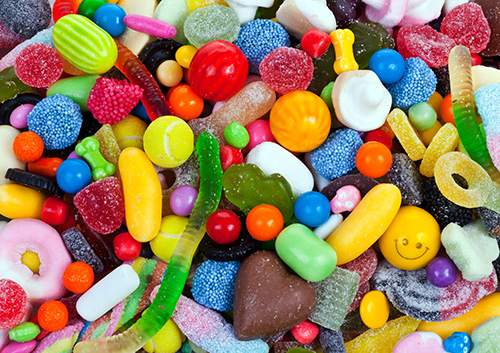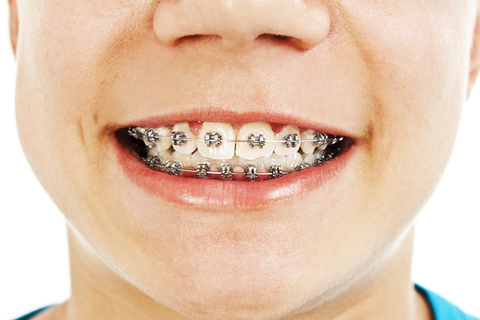May 18th, 2016

Most kids love candy; actually, most people in general love candy. So when it comes time for you to get braces there can often be a natural conflict between candy consumption and maintaining the integrity of your braces. For that reason, Dr. Donald Wexler and our team know that it’s good to know which types of candy are not good for your braces. To better illustrate, here are some candies that you will want to avoid.
Caramel
Caramel is a sweet and often exceedingly sticky and chewy type of candy that just does not mix well with braces. Caramel can cause a mess in regular teeth, but teeth with braces are a whole other story. The sticky candy can very easily get lodged and stuck between the teeth, gums, and braces, making for a difficult task of cleaning your mouth. And if your teeth don't get cleaned properly, cavities can easily form. If you get cavities while you have braces, that could mean additional appointments at our Spring Hill or Lecanto, FL office and an extended treatment time.
Salt Water Taffy
Another sticky and chewy candy to avoid with braces is salt water taffy. For many of the same reasons as caramel, it is best to avoid taffy until you get your braces removed. It may be a long wait, but when it comes to the health of your teeth, and the purpose of your braces, it really is best to avoid taffy.
Popcorn
Popcorn of any kind is best to avoid when you have braces. The kernels can easily do damage to the braces as you chomp on them, and they can get stuck between your teeth and the braces causing discomfort and further complications. In this sense it does not matter which flavor of candy popcorn you eat, all popcorn is bad news until you get your braces off.
Generally speaking, any candy that is chewy, crunchy, or sticky is not a good idea to eat with braces in your mouth. These types of candy will make life wearing braces much more difficult than if you were to just wait until your braces come off. With a little patience you will be back to eating all your favorite candy again, and with straightened teeth at that.
May 11th, 2016

Perhaps you feel your teeth are not perfectly straight, or you think your bite could be adjusted. It’s quite possible that braces and other orthodontic treatments might be the right choice for you. As orthodontic professionals, our team at Wexler Orthodontics works with your general dentist in order to determine the best options for your oral health and cosmetic appearance.
You might need braces if ...
- You lost your baby teeth relatively early in life. If your baby teeth fell out too early and your adult teeth did not come in for a while, this could have affected the way your adult teeth grew and developed.
- Your teeth look crowded or crooked. If you are embarrassed to smile because your teeth are not straight, it might be time to consider the cosmetic options available to you.
- Your jaw shifts or makes sounds. This can signify a developmental issue with your teeth and your jaw line, and orthodontic treatment may be able to help. Set up an appointment with Dr. Donald Wexler if your jaw is recessed or protruding as well.
- You are constantly biting the sides of your cheek or hitting the roof of your mouth. This could indicate that your teeth are not properly aligned. Braces can address an underbite or an overbite.
- You have a difficult time chewing your food. This is not only an inconvenience, but it can also be detrimental for your health. Braces can help fix the alignment of your teeth.
- You have to breathe through your mouth on a regular basis. You may not attribute this to an issue with the development of your teeth or jaw, but orthodontic treatment might be able to help.
The ideal age for a child to be seen by an orthodontist is age seven. However, there are many orthodontic treatment options available to adults. It is becoming increasingly common for adults to wear braces and other orthodontic devices. We recommend that people who are interested in braces and other orthodontic treatment options set up a consultation appointment with Dr. Donald Wexler today.
May 4th, 2016

The merry month of May also happens to be National Fitness and Sports Month, so take advantage of the warmer days to get outside and exercise! Bringing a friend, family member, or coworker with you when you go for a brisk walk during a lunch break can provide an opportunity to socialize as well as health benefits. If you need a little more motivation, here are some good reasons to stay active and fit.
Exercise provides:
- Improved stamina and energy as well as toned muscles and bone strength and density
- Improved circulation and breathing for a healthier heart and lungs
- Reduced risk for Type 2 diabetes and certain forms of cancer
- For older adults, regular exercise may help improve balance and reduce the risk of falls as well as improved cognitive abilities
Children and Teens
Children and teenagers spend long hours at their desks in school, on the computer, watching television, and involved in other sedentary activities that result in obesity and poor health later in life. Getting them engaged in school or community sports teams can help them form good life-long exercise habits. One important note: If they are participating in contact sports, Dr. Donald Wexler and our team at Wexler Orthodontics recommend your kids wear an approved mouthguard to protect those valuable teeth from injury! Ask us for a proper fitting of your safety appliance during your next visit!
A gym membership is nice but not necessary to stay fit; try these easy ways to work some exercise into your daily routine.
At Home
- Take a friend along for company on a walk through your neighborhood.
- Pursue gardening or other yard work, including mowing or raking.
- Take your kids on a bike ride or have them push a baby stroller around the block.
Couch potatoes take note: simply moving from the sofa to the floor for some sit-ups, leg-lifts, or push-ups while you’re watching television can help you get in better shape in no time.
At Work
- Take the stairs instead of the elevator.
- Take exercise breaks for walks around the building or parking lot.
- Walk or ride a bike to work.
So what are you waiting for? Get moving!
For more information on exercise techniques, or to schedule an appointment with Dr. Donald Wexler, please give us a call at our convenient Spring Hill or Lecanto, FL office!
April 27th, 2016

It's a moment many of our patients have experienced. One second you're chewing on a piece of gum, then suddenly you forget to keep chewing and swallow the entire rubbery gob whole! It's at this point you remember your mother warning you as a child that if you swallow gum it will stake a claim and take up residency in your belly for seven years. Dr. Donald Wexler and our team at Wexler Orthodontics hate to take all the fun out of the mystery, but the truth is that chewing gum, when swallowed, will enter your stomach and move through your digestive system just like any other piece of food. So, if you ever accidentally swallow a piece of gum, there is no need to worry!
That being said, it's important to know that gum does not have any dietary benefits, so while it’s not exactly harmful to swallow, you still want to avoid swallowing it. If you are an avid gum-chewer, we encourage you to chew sugarless gum, especially if you are wearing braces, because gum with sugar can lead to cavities. Sugarless gum still has the same amount of flavor, but has fewer cavity-causing ingredients. In fact, many brands contain an additive called xylitol, a natural sweetener known to fight cavity-causing bacteria. Xylitol is also known to increase salivary flow as it rinses away plaque and acid.
The fact is, when the bacterium in your mouth breaks down sugar, what’s left behind is acid. This acid eats away at the enamel coating of your teeth, causing holes that we call cavities. Cavities can lead to other long-term mouth problems if they are not treated in time, so it is best to try and avoid overexposing your teeth to too many harmful substances!
If you have any questions about chewing gum, please contact our office. Happy (sugar-free) gum chewing!




